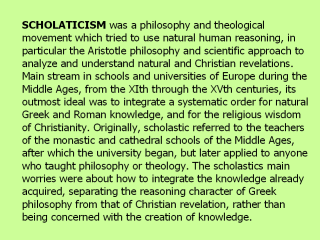 |
RENAISSANCE is a period in European
history characterized by a renewed interest in the classic past of the
Greeks and Romans, especially in its art. It began in Italy in the XIVth
century, and spread through the rest of Europe during the XVth and XVIth
centuries. During this period, the fragmented feudal society of the Middle
Ages, characterized basically by an agricultural economy and the cultural
and intellectual life domain by the church, became transformed and
progressively under the domain of centralized political institutions with an
urban and mercantile economy, in which the patronage of education, arts, and
music was developed. The term “renaissance” was used for the first time in
1855 by the French historian Jules Michelet, referring to the “discovery of
the world and of man.” The Swiss historian Jakob Burckhardt broadened the
use of this term in his work The Civilization of Italian Renaissance (1860)
and defined this epoch as the birth of humankind and of modern consciousness
after a long period of decadence. |
